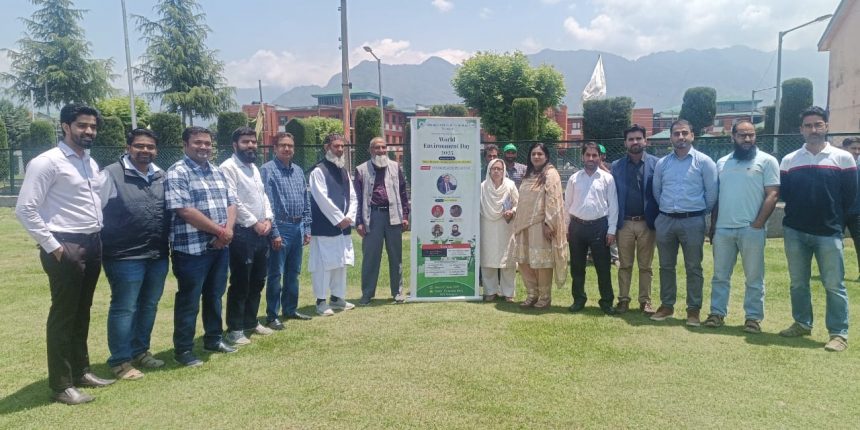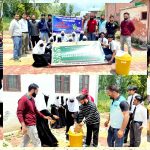Srinagar, June 05: The National Institute of Technology (NIT), Srinagar on Thursday organised a day-long seminar on World Environment Day 2025, aimed at addressing critical environmental challenges, particularly those caused by plastic pollution.
The theme of the workshop was ‘Ending Plastic Pollution’ and it was hosted by the Water Resource Management Centre (WRMC) of NIT Srinagar. Director NIT Srinagar, Prof. Binod Kumar Kanaaujiya, was the Chief Patron of the seminar. While as Dean Research and Consultancy, Prof. Roohie Naaz Mir was the patron of mega event. The event was presided over by Ms Anoo Malhotra, Director General, Rural Sanitation, J&K, who served as the Chief Guest, and Haji Manzoor Ahmad, Chairman NLCO Srinagar, who graced the occasion as the Guest of Honor.
The occasion also witnessed the presence of several esteemed dignitaries, including Registrar NIT Srinagar, Prof. Atikur Rehman, HoD Civil Engineering Department, Prof. J.A. Bhat, Chairman Water Resources Management Centre (WRMC), Prof. A.Q. Dar, and Dr. Khalid Muzamil Gani, who served as the Coordinator of the event. Incharge Director, Prof. Roohi Naaz said protecting our environment is essential for the health and well-being of our communities. Sustainable practices, combined with innovative research, are crucial to combat pollution and preserve natural resources. “This workshop fosters collaboration to develop practical solutions that safeguard our environment for future generations,” she added. In her key speech, DG, Rural Sanitation, J&K, Anoo Malhotra emphasized that technological innovation must be harnessed effectively to solve long-standing challenges in rural sanitation, especially in geographically diverse and sensitive regions like Jammu and Kashmir.
“Collaboration between academic institutions and government departments is crucial for creating sustainable sanitation models. Such workshops bridge the gap between research and implementation, enabling the development of field-ready solutions that are both effective and culturally appropriate,” she added. Malhotra further said World Environment Day is not just about speeches and slogans. It is about inspiring real change. It’s about teaching our children the value of sustainability and leading by example in our communities. Institutes’ Registrar, Prof. Atikur Rehman said that the theme of this workshop resonates deeply with one of the most fundamental aspects of human dignity and well-being sanitation. “Access to clean and safe sanitation is not merely an infrastructure challenge; it is a matter of health, environmental sustainability, and social equity, especially in our rural communities,” he added. On the occasion, Chairman NLCO, Haji Manzoor Ahmad Wangnoo, expressed his appreciation for the initiative, stating that it was heartening to see NIT Srinagar take an active interest in issues that directly impact local communities. “We need more such platforms where science meets the soil and academic knowledge translates into practical solutions,” he said. Highlighting the mission and ongoing work of NLCO, Wangnoo spoke about the organization’s dedicated efforts to restore water bodies, enhance sanitation, and raise environmental awareness in Srinagar and its adjoining areas.
“Our lakes, wetlands, and natural streams are part of Kashmir’s ecological identity, and we must act now to preserve them. The damage caused by plastic waste and untreated sewage is visible everywhere from clogged streams to declining aquatic life,” Wangnoo said. He said despite good intentions at the policy level, execution often falters due to a lack of awareness, coordination, and accountability at the grassroots. This is precisely where community-based organizations and institutions like NIT Srinagar can play a pivotal role.
Earlier, HoD Civil engineering department , Prof. J.A. Bhat expressed concern over the ineffective implementation of the plastic ban. “Although there is an official ban on plastic, its enforcement remains largely invisible on the ground. Urban areas receive some attention, but rural regions continue to be neglected,” he said. Prof. Bhat said that the unchecked use of plastic has become a serious threat to our environment, our canals are choked, and fertile lands that once produced paddy and mustard are turning barren. He further said that Dal lake’s area is shrinking, and the rise in pollution has significantly affected its fish population. The key concerns and suggestions raised during the seminar will be compiled and forwarded to the government for necessary action, Prof. Bhat added.
The seminar also hosted a panel discussion featuring a range of experts including Dr. Sami Ullah Bhat (HoD, Department of Environmental Science, University of Kashmir), Mohammad Aarif (BDO, Gund Kagan Ganderbal), Hakeem Aaqib Javaid (BDO, Qazigund) and Saqib Abass Khan (AE, Rural Development Department). Dr. Khalid Muzamil Gani, coordinator of the workshop, expressed his gratitude to the Chief Guest, Anoo Malhotra, and Guest of Honor, Haji Manzoor Ahmad, for their valuable presence. Dr. Khalid also highlighted the need for ongoing collaboration to advance rural sanitation and environmental sustainability. As part of the World Environment Day observance, a plantation drive was also held outside the Common Hall, where dignitaries, faculty members, students, and officials actively participated by planting saplings.








